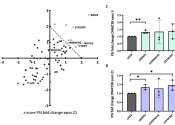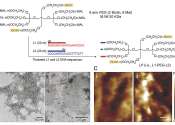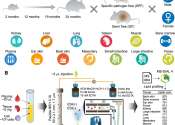Medical research news
New strategy could turn intravenous medicines into pills
For many people with cancer, intravenous (IV) infusions of chemotherapy are their best chance at a cure. But these infusions can be inconvenient or inaccessible to patients, and some complications arise not from the active ...
9 hours ago
0
14

Exploring dental health sensing using a sonic toothbrush
Dental hygiene is an important component to the overall health of a person. Early detection of dental disease is crucial in preventing adverse outcomes. While X-rays are currently the most accurate gold standard for dental ...
10 hours ago
0
47

DAPK3 emerges as a new regulator of migration of triple-negative breast cancer cells
Triple-negative breast cancer (TNBC) is the subtype of breast cancer that is the hardest to treat. TNBC patients account for more than 20,000 cases of this condition annually in the U.S. alone. They experience worse outcomes ...
10 hours ago
0
2

Echoes in the brain: Why today's workout could fuel next week's bright idea
In a rare, longitudinal study, researchers from Aalto University and the University of Oulu tracked one person's brain and behavioral activity for five months using brain scans and data from wearable devices and smartphones. ...
12 hours ago
0
57

Hot sauce study finds asymmetric placebo effect can offer insights into pain perception
The expectations humans have of a pleasurable sensation asymmetrically shape neuronal responses and subjective experiences to hot sauce, according to a study published October 8, in the open-access journal PLOS Biology by ...
12 hours ago
0
11

New technique that makes competition between tumor cells visible can help personalize treatments for multiple myeloma
Not all cells within the same cancer are the same. They all have genetic errors that turn them into tumor cells, but these errors are not identical. In each cancer, there are populations of cells with different mutations, ...
11 hours ago
0
81

Significant worldwide disparities seen in availability and timeliness of new cancer drugs
Despite considerable progress in the discovery and development of new cancer drugs, there are significant disparities in both the availability and timeliness of these medicines worldwide, with poorer countries missing out, ...
7 hours ago
0
12

Unlocking the brain: Using microbubbles and ultrasound for drug delivery
The brain is a stronghold, the central command center for the body, protected by the blood-brain barrier (BBB). This network of blood vessels and tissues acts as a biological gatekeeper, a selective filter that prevents harmful ...
14 hours ago
0
38

Psilocybin may lead to increased optimism, rat study suggests
Monash University researchers have made a breakthrough in the study of psychedelics to treat disorders including major depression, demonstrating that rats given psilocybin exhibit increased optimism over time.
15 hours ago
0
80

Study shows adolescence and young adulthood are risky periods for those living with diabetes
For young people living with diabetes in Quebec, adolescence and young adulthood are periods marked by a significantly higher risk of interruptions in clinical care, hospitalizations and emergency room visits, reveals a study ...
14 hours ago
1
5

How diabetes risk genes make cells less resilient to stress
The cells in your pancreas, like people, can only handle so much stress before they start to break down. Certain stressors, such as inflammation and high blood sugar, contribute to the development of type 2 diabetes by overwhelming ...
15 hours ago
0
3

Failure in a CAR T cell trial could unlock multiple treatments for acute myeloid leukemia
In the clinical battle against leukemia, recent breakthroughs in chimeric antigen receptor T cells (CAR T) have given patients and doctors an unprecedented weapon. CAR T cell therapy has demonstrated efficacy in treating ...

Study shows Parkrun boosts life satisfaction for less active participants
A new study by Sheffield Hallam University and The University of Sheffield, UK, reveals that participation in Parkrun, a weekly 5-kilometer social run (or walk), significantly benefits life satisfaction among its least active ...

Scientists use stem cells to recreate a hallmark of Parkinson's disease in human neurons
Lewy bodies are a hallmark of Parkinson's disease (PD) and other related neurological conditions. Understanding why and how they develop is critical to developing better treatments.
21 hours ago
0
21

Cell line models identify cause of melanoma with drug resistance
Melanoma is a type of cancer that originates from melanocytes, the cells responsible for producing skin pigment, and is known as the most lethal form of skin cancer due to its high rates of metastasis and recurrence. With ...
12 hours ago
0
4

Study finds that when it comes to emergency care, ChatGPT overprescribes
If ChatGPT were cut loose in the Emergency Department, it might suggest unneeded X-rays and antibiotics for some patients and admit others who didn't require hospital treatment, a new study from UC San Francisco has found.
21 hours ago
1
8

Mental health app could help prevent depression in young people at high risk
A cognitive behavioral therapy (CBT) app has been found to significantly prevent increases in depression in young people who are at high risk—and could be implemented as a cost effective public mental health measure.
13 hours ago
0
35

Tool listens in on early osteoarthritis biochemical communication in joints
A fluorescent dye could help scientists listen in on biochemical conversations between cartilage and bone during the earliest stages of osteoarthritis (OA)—even before the disease causes pain. The unexpected finding could ...
14 hours ago
0
31








































